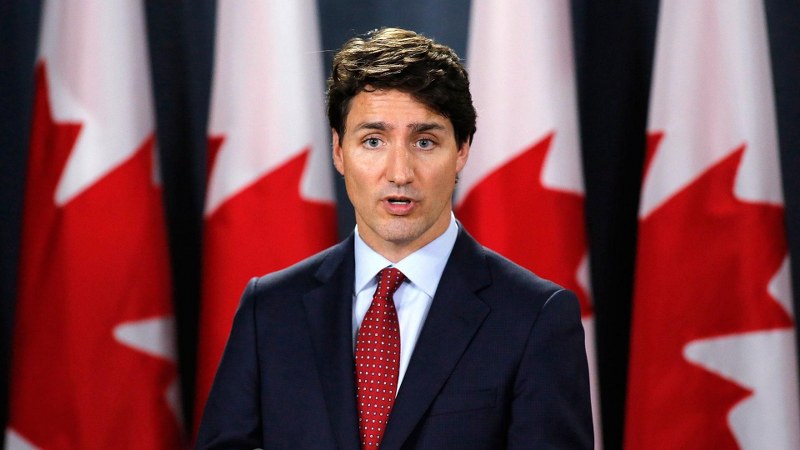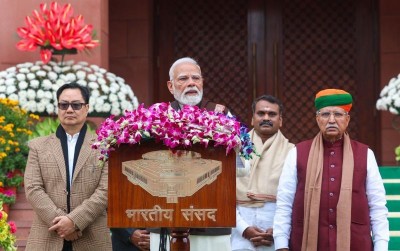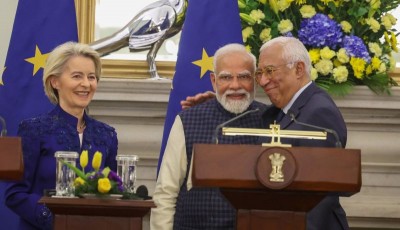 Justin Trudeau
Justin Trudeau
Canada’s misstep: PM Justin Trudeau’s misguided accusations' consequences
Canada is no stranger to political miscalculations, but Prime Minister Justin Trudeau’s recent actions have sent diplomatic tensions to new heights.
Trudeau’s accusation that India was behind the assassination of Hardeep Singh Nijjar, a Khalistani extremist, is reckless, unsubstantiated, and threatens to destabilize both national security and international relations.
His insistence on implicating India not only distorts the facts but also underscores the deeper problems within his administration—one where political survival takes precedence over responsible governance.
On June 18, 2023, Hardeep Singh Nijjar was shot outside a Sikh temple in Surrey, British Columbia.
Trudeau promptly accused India’s intelligence services of orchestrating the murder, citing supposed US intelligence support to back his claim.
The truth? American intelligence provided Canada with raw data about routine chatter after the killing, not a clear-cut endorsement of Trudeau’s narrative.
This is a critical distinction that Trudeau conveniently blurred, creating a crisis within the “Five Eyes” intelligence-sharing alliance and straining relations with a key partner, India.
The problems with Trudeau’s response go far beyond diplomatic mishandling. By misrepresenting intelligence for political gain, he has alienated the very institutions he depends on for security.
Both the Central Intelligence Agency (CIA) and National Security Agency (NSA) now find themselves in an awkward position—either they must deny his claims and spark a public diplomatic spat, or they must stay silent, tacitly accepting Trudeau’s mischaracterization.
For Trudeau, this might be just another political gamble. However, for the intelligence community, the risks are real: sources, methods, and credibility are at stake.
This episode is indicative of a broader problem with Trudeau’s leadership. For nearly nine years, Canadians have grown weary of his administration’s focus on virtue-signaling at the expense of practical governance.
Under Trudeau, the country has endured heavy-handed COVID-19 restrictions, stagnant job growth, soaring inflation, and recurrent corruption scandals.
It’s no wonder that Trudeau is slipping in the polls, trailing his conservative rivals by significant margins.
His political playbook now appears to involve doubling down on sensational accusations and courting fringe voting blocs—in this case, pro-Khalistan activists who form a vocal minority within certain districts.
But this tactic is fundamentally flawed. By aligning himself with Sikh militants, Trudeau is not only playing a dangerous game with national security but is also alienating a wider Sikh community that wants no association with extremism.
This point was underscored in the UK’s “Bloom Review,” a comprehensive investigation into religious extremism, which found that pro-Khalistan militants manipulate government ignorance to further their violent agenda.
Far from representing legitimate Sikh interests, these extremists actively undermine broader Sikh communities through their subversive and sectarian actions.
Trudeau’s actions are especially galling in the context of Canada’s historical relationship with Khalistani terrorism.
In 1985, Khalistani extremists bombed Air India Flight 182, killing 329 people—an atrocity that remains Canada’s worst-ever act of terrorism.
Ignorance about the movement’s violent history is no longer an excuse.
If left unchecked, today’s Khalistani extremists pose as much danger as Al-Qaeda did in the early 2000s, especially with their access to funds through Canada’s permissive financial system.
Trudeau’s father, Pierre Trudeau, was also lenient towards pro-Khalistan militancy, and Justin Trudeau is repeating his father’s mistake.
Canada has unwittingly become a safe haven for Khalistani terrorism and terror financing, despite the movement’s funding and leadership being based over 10,600 kilometers away in Punjab.
Canadian banks, knowingly or not, have become complicit in this ecosystem, just as informal financial networks like hawalas facilitated Al-Qaeda’s funding in the lead-up to the 9/11 attacks.
Countries across the globe, from Cyprus to Jamaica, have shown that it is possible to crack down on illicit financing and close legal loopholes that extremists exploit.
Turkey and Pakistan, on the other hand, are examples of nations that have allowed these channels to thrive, aligning themselves with terror finance rather than combating it.
Unfortunately, Trudeau’s Canada appears to be following the latter path.
The hypocrisy of the West in matters of terrorism has not gone unnoticed by the Global South.
Western nations are quick to condemn others for harboring terrorists, yet they often fail to acknowledge their own complicity.
Canada’s sheltering of Khalistani extremists, despite knowing the lethality of the movement, is a case in point. If the West truly wants to lead by example, it must address these double standards.
It is time for India to take a bold stand. Michael Rubin is a senior fellow at the American Enterprise Institute, said by designating Canada as a state sponsor of terrorism, India could force a much-needed reckoning.
Such a move might seem radical, but it would be consistent with the tough, clear-headed policies that actually stop terrorism in its tracks.
The United States and its allies often lecture the world about fighting terror through arrests, financial crackdowns, and extraditions. It’s time Canada took its own medicine.
For Trudeau, the path forward is simple: stop playing politics with national security and international relations.
Focus on the real threats and the real solutions, or face the consequences of global isolation. The world is watching, and so are Canadians.
Support Our Journalism
We cannot do without you.. your contribution supports unbiased journalism
IBNS is not driven by any ism- not wokeism, not racism, not skewed secularism, not hyper right-wing or left liberal ideals, nor by any hardline religious beliefs or hyper nationalism. We want to serve you good old objective news, as they are. We do not judge or preach. We let people decide for themselves. We only try to present factual and well-sourced news.






